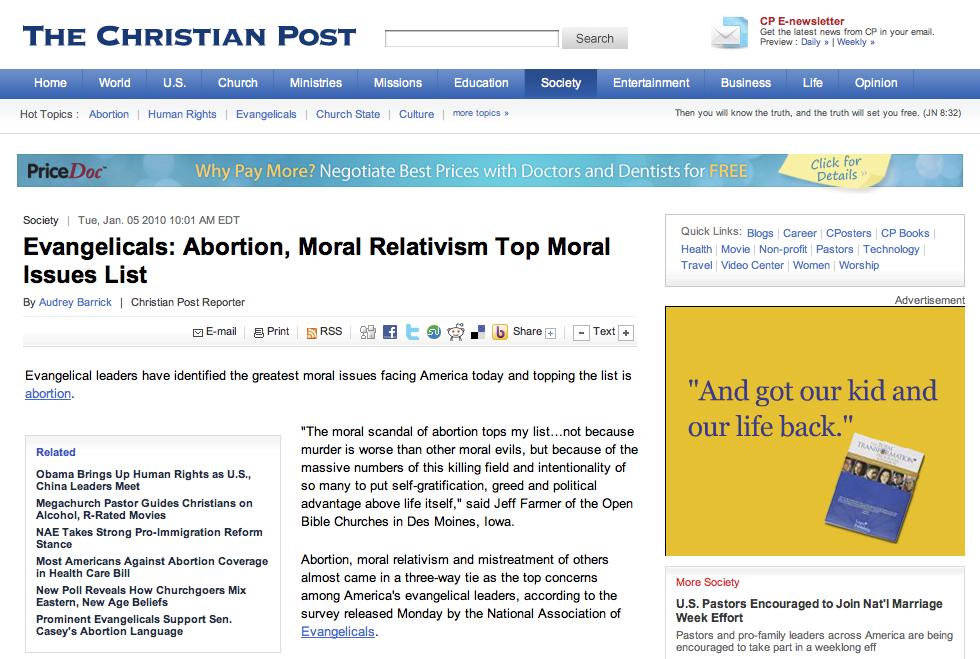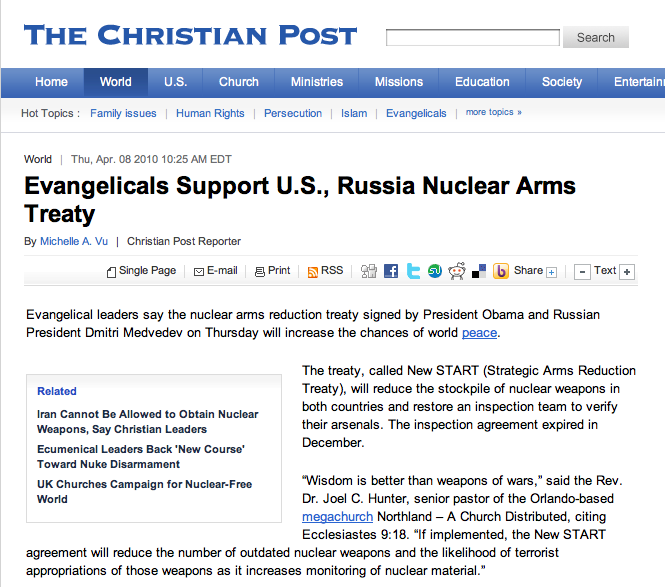 Evangelical leaders say the nuclear arms reduction treaty signed by President Obama and Russian President Dmitri Medvedev on Thursday will increase the chances of world peace.
Evangelical leaders say the nuclear arms reduction treaty signed by President Obama and Russian President Dmitri Medvedev on Thursday will increase the chances of world peace.
Evangelical leaders say the nuclear arms reduction treaty signed by President Obama and Russian President Dmitri Medvedev on Thursday will increase the chances of world peace.
The treaty, called New START (Strategic Arms Reduction Treaty), will reduce the stockpile of nuclear weapons in both countries and restore an inspection team to verify their arsenals. The inspection agreement expired in December.
"Wisdom is better than weapons of wars," said the Rev. Dr. Joel C. Hunter, senior pastor of the Orlando-based megachurch Northland - A Church Distributed, citing Ecclesiastes 9:18. "If implemented, the New START agreement will reduce the number of outdated nuclear weapons and the likelihood of terrorist appropriations of those weapons as it increases monitoring of nuclear material."
"It therefore will increase the chances of world peace from both state and non-state actors."
The new treaty, if ratified by lawmakers in both countries, would require each country to have a maximum of 1,550 strategic warheads, down from 2,200. It would also limit both countries to 800 total launchers, down from 1,600.
New START is seen as a sign of President Obama's commitment to make good on his promise of a nuclear weapon-free world.
Almost exactly a year ago, Obama had given a speech in Prague where he articulated his commitment to seek a world without nuclear weapons. On Thursday, Obama and Medvedev signed the historic arms reduction pact also in Prague.
"I can hardly imagine a more important foreign policy goal for Christian citizens of the United States than pursuing a realistic, comprehensive strategy to reduce the number of strategic nuclear weapons - weapons which cannot be used in any conceivable scenario in accordance with the principles of just war," said Andy Crouch, senior editor at Christianity Today International.
Crouch called the New START treaty a significant step towards "greater security, stability, transparency, and predictability, and toward the ultimate goal of shaping of a world where the use of nuclear weapons, by anyone, is truly impossible."
The United States and Russia has 95 percent of the global stockpile of nuclear weapons. The huge buildup of nuclear weapons in both countries is a result of the Cold War. Other countries with nuclear weapons include the United Kingdom, France, China, India, and Pakistan.
Israel is thought to have nuclear weapons but has never publicly declared it does, and Iran and North Korea are also suspected of possessing or building nuclear weapons.
The New START treaty, the first was in 1991, was signed just two days after the Obama administration released its Nuclear Posture Review, which more clearly defines in what situation and against whom the U.S. can use nuclear weapons.
Under the 2010 Nuclear Posture Review, the U.S. cannot use nuclear weapons to attack a non-nuclear country that complies to the Nuclear Non-Proliferation Treaty. The new document also changes nuclear command structure to help prevent accidental launch, rejects new nuclear weapons programs, and reduces the role of nuclear weapons in the U.S. national security strategy.
Christian anti-nuclear weapons group Two Futures Projects calls the Nuclear Posture Review a step towards a "morally sound" nuclear policy.
The Rev. Tyler Wigg-Stevenson, director of the Two Futures Project, told The Christian Post Wednesday that in a post-Cold War era the U.S. can no longer depend on the deterrence strategy to maintain world peace. These days,he said, nuclear weapons can fall into the hands of terrorists who do not care if we retaliate with nuclear weapons because some of them have a suicide bomber mentality.
Wigg-Stevenson called for a "wholesale reassessment" of the U.S. nuclear security paradigm in the 21st century.
"The status quo is not protecting our people," he asserted.
"We can't wait until a crisis happens. We have to do all the work up ahead," he said, commenting on the possibility of terrorists obtaining nuclear weapons.
He added that in a just war framework the only somewhat moral explanation for possessing nuclear weapons is to deter an attack. But one cannot make a moral case of deterrence to permanently possess nuclear weapons.
The Baptist preacher said Christians should view their responsibility to advocate for the abolishment of nuclear weapons like their faith commitment to fight human trafficking or eliminate extreme poverty. Though anyone with a conscience would care about these issues, Wigg-Stevenson said Christians should bring the "zeal" to the issue because they believe in protecting innocent life.
President Obama will continue addressing the nuclear weapons issue next week during the nuclear security summit in Washington that will draw the world's top leaders.
Michelle A. Vu
Christian Post Reporter
FIND THIS ARTICLE AT: http://www.christianpost.com/article/20100408/evangelicals-support-u-s-russia-nuclear-arms-treaty/index.html
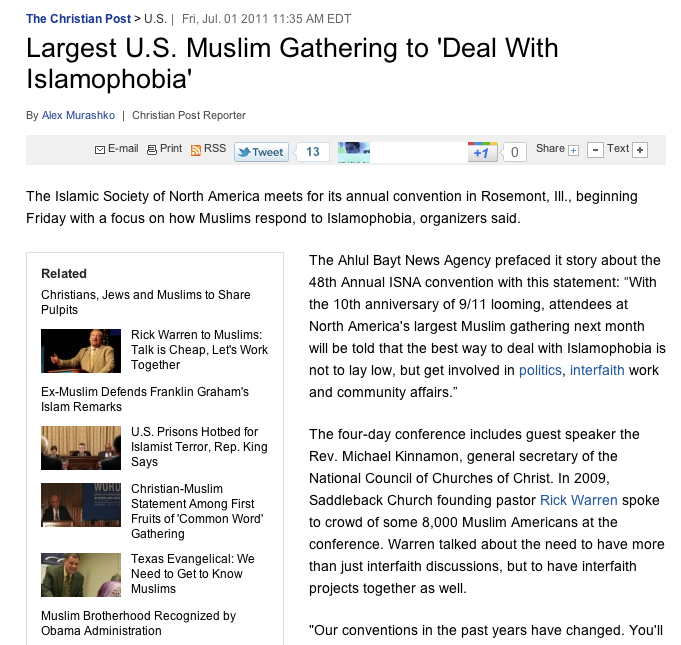 The Islamic Society of North America meets for its annual convention in Rosemont, Ill., beginning Friday with a focus on how Muslims respond to Islamophobia, organizers said.
The Islamic Society of North America meets for its annual convention in Rosemont, Ill., beginning Friday with a focus on how Muslims respond to Islamophobia, organizers said.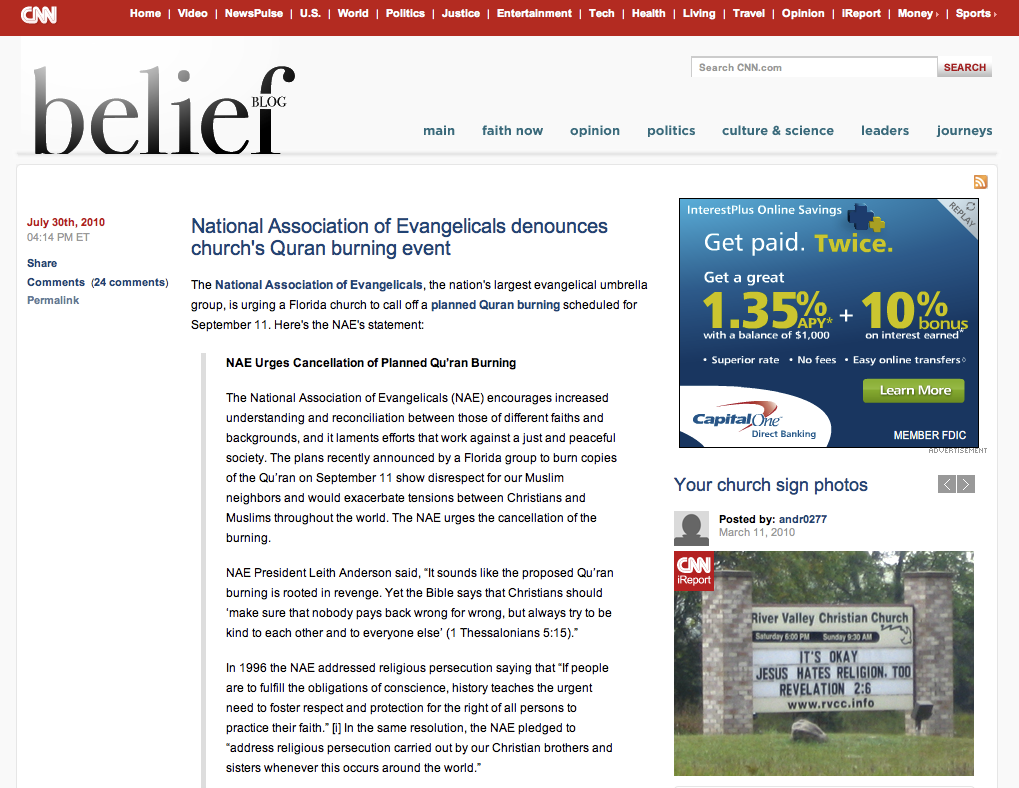

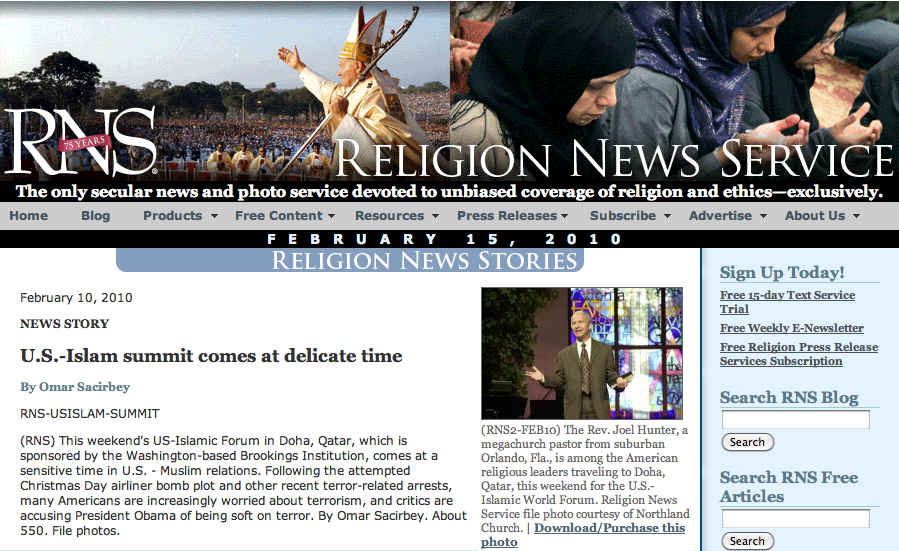 This year’s U.S.-Islamic World Forum, held Feb. 13-15 in Doha, Qatar, comes at sensitive time in U.S.-Muslim relations.
This year’s U.S.-Islamic World Forum, held Feb. 13-15 in Doha, Qatar, comes at sensitive time in U.S.-Muslim relations.